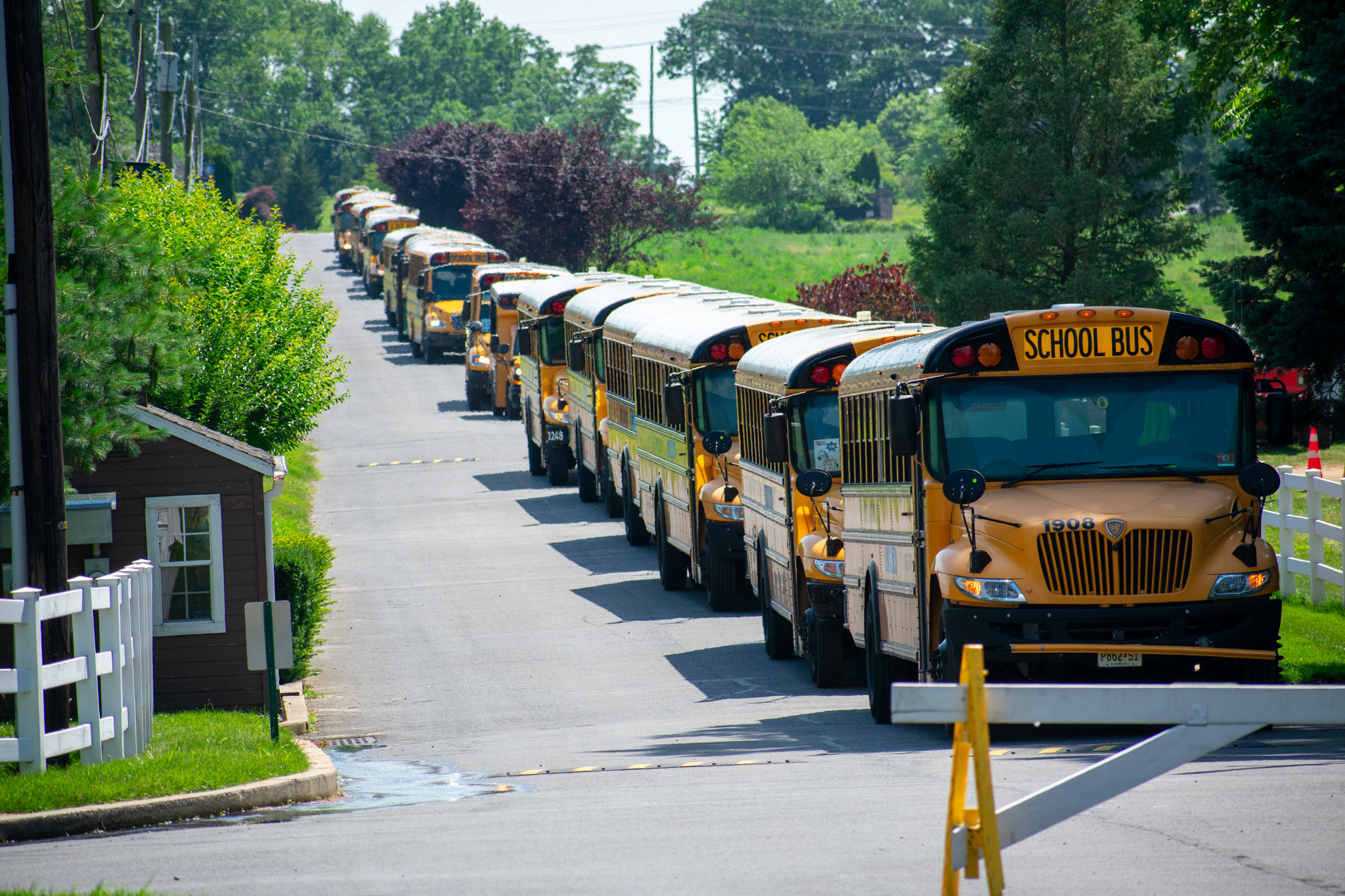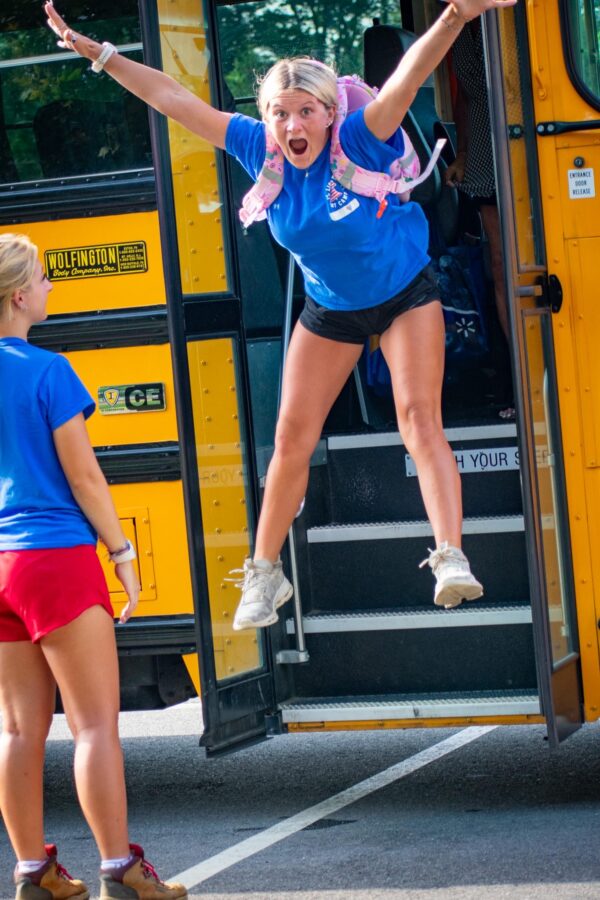

For many families, transportation is the most important—and most stressful—part of the camp search. A great camp bus experience can make mornings smooth and help kids start their day feeling confident and cared for. A poorly run system, on the other hand, can create chaos before the first activity even begins.
For New Jersey families across Burlington County, Mercer County, Camden County, and the wider South Jersey area, “day camps with transportation” is often one of the first things they search for. Understanding how a camp’s bus or carline system works can help you compare programs and choose the right fit for your child.
This guide explains how transportation works at quality day camps, what questions to ask directors, and how to evaluate whether a program’s system is reliable and safe. If you’re comparing multiple types of camps, you might also review the day camp vs overnight camp comparison and the day camp vs sports camp guide to see how transportation fits into the bigger picture.
If you’re looking at safety and readiness more broadly, you may also want to explore:
- How to Evaluate Day Camp Safety
- 30 Essential Questions to Ask on a Camp Tour
- Choosing the Right Summer Day Camp for Your Child
- Is My Child Ready for Day Camp?
1. How Transportation Fits Into the Camp Experience
For many campers, the day begins long before they reach camp. The bus ride is:
- A time to connect with friends
- An extension of camp culture and routines
- A chance for counselors to set the tone for the day
- An environment where safety and supervision really matter
Strong programs treat bus transportation as the first—and last—program area of the day, investing in staff training and consistent procedures. To see how transportation fits into a complete safety system, you may want to review How to Evaluate Day Camp Safety.
2. Who Supervises the Bus?
Most quality camps place at least one trained counselor on every bus. Their role includes:
- Greeting campers at each stop
- Conducting roll call multiple times
- Managing seating and behavior
- Communicating with camp via phone or radio
- Keeping the atmosphere positive and calm
On routes with many campers, some camps add a second counselor or a “bus captain” who oversees safety and communication. The driver focuses on the road; the bus staff focus on the campers.
3. What Happens During Pickups & Drop-Offs?
Pickups and drop-offs are some of the busiest moments of the day, and strong camps run them like well-choreographed routines. Look for:
- Consistent, published pickup and drop-off windows
- Clear communication when buses are delayed
- Adults positioned on both sides of the bus door
- Predictable, step-by-step loading and unloading procedures
- Staff trained to look for signs of anxiety or hesitation in campers
If your child is new to camp, the first-day preparation guide can help make mornings smoother and less stressful for everyone.
4. Attendance Tracking & Communication
Good camps use a multi-layered system to ensure children are accounted for at all times. That means more than a quick headcount.
Look for practices like:
- Roll call at every stop when campers board and again when they exit
- Cross-checks with attendance systems when buses arrive at camp
- Radio or app-based check-ins between bus staff and transportation supervisors
- Follow-up protocols when a camper is unexpectedly absent or at the wrong stop
This structure prevents mix-ups and ensures that when your child is expected, someone is actively looking for them. It’s an important part of the overall safety picture, just like lifeguards at the pool or counselors on the field.
5. Safety Procedures While on the Road
A strong transportation system includes clear rules and expectations, such as:
- Assigned seating or seating zones for consistency and supervision
- Rules about staying seated while the bus is moving
- Guidelines for talking volume and behavior
- Procedures for loading and unloading near traffic
- Emergency and evacuation drills for staff (and, when appropriate, for campers)
If your child struggles with transitions, social navigation, or bus anxiety, the social skills development article may help you prepare them for the social aspects of the ride.
6. Alternate Pickups & Schedule Changes
Life happens—appointments, carpools, and last-minute changes are part of every family’s summer. When that happens, the camp’s procedures matter a lot.
Ask camps:
- How to authorize someone new for pickup
- How changes should be communicated (email, text, parent portal, phone call)
- Whether there’s a PIN or code-word system for added security
- How early dismissals are handled on-site
Consistency matters more than anything. You want a camp that has clear, repeatable procedures—not improvisation each time something changes.
7. How Camp Transportation Differs Between Program Types
Parents comparing different camp models often want to know how transportation varies between:
- Traditional New Jersey day camps with transportation
- Sports camps and specialty programs
- Overnight or sleepaway camps
- Local “camp-style” programs run by schools or towns
Each program type handles routes, counselors, and safety differently—which is why it’s important to ask specific questions during your camp tour. For deeper comparisons, see:
8. Related Questions Parents Often Search
When researching day camps with transportation in New Jersey, parents also search for:
- Which NJ day camps offer bus transportation?
- How safe are camp buses for young children?
- What should I expect during the first week of day camp transportation?
- How do camps handle separation anxiety at morning drop-off?
- What happens if a camp bus is running late?
- How does transportation work at South Jersey day camps?
Your goal isn’t just to find a camp that “has buses,” but a camp that treats transportation as an essential part of its safety and camper experience systems.
9. Why Transportation Might Influence Your Camp Choice
Transportation affects more than logistics. It influences:
- Your daily schedule and commute
- Drop-off and pick-up stress
- Your child’s comfort at the start and end of each day
- Your child’s sense of independence and readiness
- Overall safety and accountability
If a camp can clearly explain its transportation procedures, show you real systems, and introduce the staff responsible for buses and carline, that’s a strong sign of a well-run program.
To compare transportation and safety systems across camps, explore:
Transportation FAQs
Is transportation safe at day camps?
When it’s staffed and managed properly, day camp transportation can be very safe. Strong programs train bus counselors, maintain clear attendance procedures, assign seating, and monitor behavior. Parents should ask camps to explain their pick-up, drop-off, and in-transit supervision systems.
Who supervises my child on the bus?
Most quality programs place at least one trained counselor on each bus to supervise behavior, conduct roll call, and communicate with camp if delays or issues occur. Some routes also have a “bus captain” or a second counselor on board.
How do camps track attendance on buses?
Good camps use multiple layers of tracking: roll call at every stop, attendance checks at camp arrival, and communication between transportation staff and counselors. This reduces the chance of errors during pick-up and drop-off.
What if someone else needs to pick up my child?
Quality camps require authorization—such as written permission, a PIN system, or a verified note in the parent portal—before releasing a child to a new adult. Parents should ask camps to explain their alternate pickup procedures clearly.
Which New Jersey day camps offer transportation?
Many New Jersey day camps, especially in Burlington, Mercer, and South Jersey, offer bus transportation from surrounding towns. When comparing options, ask specifically about routes, stops, supervision, and how far the camp’s transportation network reaches.
Is bus transportation included in camp tuition?
It depends on the camp. Some New Jersey day camps include transportation in tuition, while others charge an additional fee based on routes or distance. Always ask for a clear breakdown of costs when you review pricing.
Related Articles
- Day Camp vs Sports Camp
- Day Camp vs Overnight Camp
- How to Evaluate Day Camp Safety
- Is My Child Ready for Day Camp?
- Preparing for the First Day of Camp
- Camp Comparison Hub
If you’d like to see how a transportation-supported New Jersey day camp operates up close, you can schedule a tour, email fun@libertylakedaycamp.com, or call 609-499-7820.

 Schedule A Tour
Schedule A Tour Contact Us
Contact Us